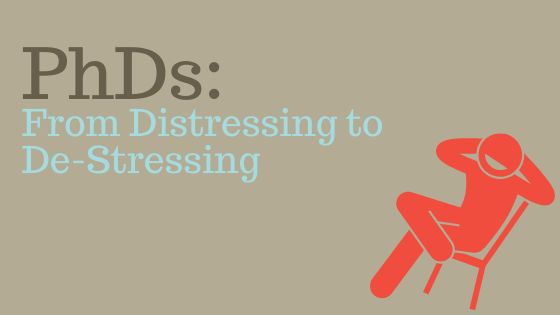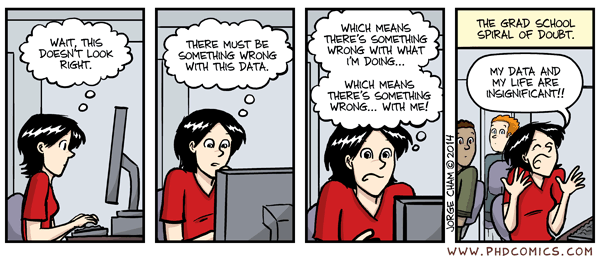When I searched for the origin of the word “stress”, I found that it is partially taken from an old French word “estresse”, that is narrowness and oppression. If I add the word “PhD” along with “stress”, hundreds if not thousands of articles, blogs and surveys pop-up discussing the effect of stress on PhD students.
Written by: Mirna Ghemrawi, Florida International University
A very recent survey by Nature reveals that 36% of graduate students (from a population of more than 6000 participants from around the world) asked for help to deal with their anxiety and depression [1]. A PhD student’s success is mainly governed by the number of published papers, funding opportunities, professional meetings and research impact [2]. This pressure along with other complications like visa status (for international students), society expectations, and fear from an uncertain future makes a graduate student life more concerning.
I can easily list why we stress, but my aim in this blog is to help you (and myself) to find ways to de-stress. When I actually decided to write on this topic, I received, out of nowhere, an email from my school’s Associate Dean inviting us to attend an event titled: “Stressed out? Learn how to use mindfulness to reduce stress”. What are the odds? So, I would like to share with you what I learned.
First, mindfulness doesn’t mean to be always happy, but to observe the emotions without judging them as good or bad. Observing our emotional status is not only through passive mediation practices but also in active ones like walking and exercising. It is also important to know that through mindfulness, we should think and plan with conscious awareness. So, mindfulness can improve the overall mental health as it can teaches us that thoughts are not facts. This comic below is funny, but it is also a true story of many of us when we work for long hours, expecting only good results.
In this event, we were introduced to a few practices to help us in reducing our stress that I found easy to implement. One is to create formal mindful pauses during the day to feel the body, breath, let go of our thoughts and return to the present with acceptance and gratitude. Another piece of advice that I, personally, should work on, is to stop multitasking and start monotasking. It is actually very exhausting to try to check our phone and social media platforms, reply to emails, do some lab experiments and study for an exam at the same time. It is also important to plan our week and our day. I have actually tried this strategy and started to write my “to-do list” and would scratch out every task I finish. It gives you a feeling of satisfaction and a push to do the next one.
The speaker, Ellen Campos Sousa, also recommended to take a mind-body class or mindfulness course and referred to a free online training. This online course is Mindfulness-Based Stress Reduction (MBSR) training to help in coping with everyday life challenges and deal with distressing situations with kindness and tranquility. It looks like a magic remedy, right? Well, you try it and then decide. Based on participants reviews though, they reported that they felt more “in-tune” with themselves and people around them. In fact, it is not expected from us to be stress-free from the first shot, but it requires a mindset to try and practice. If we find time to check our social media and the news, we also should allocate sometime to practice mindfulness to help in reducing our stress.
Each one of us deals with stress differently. And since many of us are more visual, I created a short video combining some tips and examples to de-stress with the help of some graduate students at FIU and Ellen Campos Sousa, the speaker of the previously mentioned event, I hope you enjoy it.
Here is a mnemonic, not the best, yet summarizes few exemplars to de-stress.
Disclaimer: I have added some caricature-ish pictures in this video with the only intention of making it more entertaining.
References:
[1] https://www.nature.com/articles/d41586-019-03459-7
[2] https://www.nature.com/articles/d41586-019-03489-1
WOULD YOU LIKE TO SEE MORE ARTICLES LIKE THIS? SUBSCRIBE TO THE ISHI BLOG BELOW!
SUBSCRIBE NOW!




